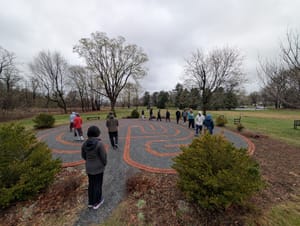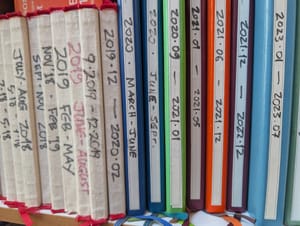On the fourth day, we walked slowly into the labyrinth, step after step, walking around one loop, turning, and returning along another, when tears started welling up in my eyes. I was weaving closer, then turning away, gradually approaching the center, but always indirectly. The more I walked, the more these tears threatened to spill over. Step after step after step, loop after shortening loop. And then I reached the middle. The tears overflowed.
I was the last person on the walk, so it was easy to turn my face away from the others, who had taken a shortcut out and were already heading back to the retreat center. I wasn't embarrassed, but I wasn’t ready for anyone to reach out with a sympathetic word or a hug, either. I wanted to savor these tears on my own.
I was unsure where the tears were coming from or why the labyrinth had brought them to the surface, and I wanted some space to look deeper into the well.
Retreats often leave me feeling peeled, like an onion, raw and exposed to the world. This one, the culminating in-person get-together after an eight-month Buddhist studies class, put me in a state less vulnerable than usual, but still reflective. I was meeting people I'd only known on Zoom and finding them to be sweet, funny, warm, and three-dimensional. I had long conversations with a good friend who also took the class, and with whom I traveled cross-country to attend the retreat. All the concepts, ideas, sutras, and commentaries we'd studied were present, at least in the back of my mind, as an intellectual framework for our practices of sitting, walking, chanting, and eating mindfully together. I contemplated continuing for the remainder of this four-year Buddhist Studies program. And I wondered how this study might fit into my daily life.
And then, these mysterious tears.
I still don't exactly know where they came from. I am a white guy from Ohio, so it won’t surprise you to know that crying is not a frequent activity for me. Like many white men, it feels weird for me to talk about it or write about it. Like many men, I often find tears (my own or others’) baffling.
These tears appeared to me at first like a sense of regret: So much time I've spent not knowing what I was doing. So much time wasted rushing around, chasing transient distractions that I don't even remember all that well. So much drinking. So much time grinding away at work.
The tears could have come from a sense of deep sorrow over the brokenness of the world and the chainsaws being taken to institutions that have kept us safe, healthy, informed, and educated for decades: National health agencies, funding programs for fighting cancer, vaccination programs, universities, national parks, housing support, voting rights, elementary education, international aid. A deep upwelling of grief over the killing, kidnapping, imprisonment, apartheid, and war that my country wages and funds. Sadness over my inability to do much about any of it.
Or they could have come, simply, from the action of walking the labyrinth — an embodied, rhythmic, circular ritual designed to provoke release and insight.
People have been designing and walking labyrinths for thousands of years. Many of the great cathedrals, like Chartres, have one (as do many small parish churches, even here in the U.S.). Labyrinths are aids to meditation and contemplation. One of the retreat teachers, who used to lead labyrinth experiences, told me that the pattern of walking a labyrinth is traditionally divided into three parts: Purgation, Illumination, and Union.
- Purgation: As you walk toward the center, you release your cares, let go of your mundane worries, and shed the world.
- Illumination: In the center, you arrive fully in the present moment, allowing reality — the divine — to shine through and with you.
- Union: As you walk back out, you gradually reintegrate with the world, bringing what you received in the center with you and carrying it forward.
I’d gone on the retreat looking for illumination of some kind, but I skipped over that first step. Then it caught up to me in the labyrinth. Let go, the labyrinth said. Let go and stop rushing about so much. Make space for things to sink in a bit.
Just yesterday, I found myself talking with a client about my retreat. I didn’t mention the labyrinth, but I explained to her how important it is for me to step away from the screen and the constant emails occasionally, to find a sense of space. It’s why I spend every Saturday offline, or as near to offline as I can get: A digital sabbath where I return to the world around me, without the mediation of a smartphone or a laptop. Just trying to be as present to the world as I can be.
It’s not easy to disconnect. The digital world is insistent, urgent, and addictive. But that’s exactly why it’s so important to pull the plug occasionally — to reclaim our autonomy from the algorithms.
On Saturdays, I write longhand in my notebook. I write postcards to my friends. I play the banjo (not well), the ukulele (ditto), or the shakuhachi (even worse). I go for walks or bike rides, or drive somewhere with my family. And I rediscover, as I did on that retreat, a little bit of the vividness of the world.
That, I think, was the deeper reason for my tears. I was re-encountering the cosmos and realizing how much I’d been taking for granted. I felt sadness, yes, but also gratitude for the space to open up to the world and be there for it, whatever was happening. I was there. I didn’t have to label or understand everything. There were, all around me and within me, many deep conditions for happiness, whether or not I could see them.
A few days after the retreat, I went for a long walk along the cliffs of the Shawangunk Ridge, a mighty rock formation that seems like the spine of the Hudson Valley. I heard voices floating up from the valley below, very far away yet startlingly clear. I sat for a few moments on the edge of a great bowl of snow, two hundred feet across, in the shadow of the cliffs, appreciating the silence of the pines. I made short, artsy videos of trickling water, wet lichen, moss, and rock. I heard something heavier than a bird rustling in the bushes next to a small marsh, maybe ten feet from where I stood, and I crouched there a few minutes, listening and watching. But whatever it was, it stayed hidden.
Sometimes you don’t need to understand everything that’s going on. You don’t always need to click Like or Subscribe, to identify that bird, or even to lay eyes on what’s rustling in the bushes. Sometimes, it’s enough just to know that you were there with some other being, sharing a moment in the woods.
Recommendations
The movie Flow by Gints Zilbalodis: This animated film tells the story, without words, of a cat who manages to survive an apocalyptic flood by making friends with a capybara, a dog, a lemur, and a secretary bird.
The NY Times Poetry Challenge: Memorize “Recuerdo” by Edna St. Vincent Millay: I didn’t think I would enjoy a rather sing-songy poem from the 1920s this much, but I was absolutely smitten. Not just by the poem, but by the thoughtful and creative way the editors assembled the series and helped me memorize the poem. Of special note: Recordings of the poem by Millay herself, Ethan Hawke, and Reginald Dwayne Betts — among many others.
This poem by Larson Langston: “I don’t want to kill any dragons …”
The Mechanics’ Institute Library: A surprisingly beautiful oasis in the heart of downtown San Francisco. I will host an in-person writing circle there on Wednesdays in May, starting this week. Contact me if you’re interested!
I’d love to hear what’s illuminating your world these days. Please use the comments form below to share what’s alive for you!
Thank you, Alicia Bonner, for your feedback and editing suggestions on this piece.



